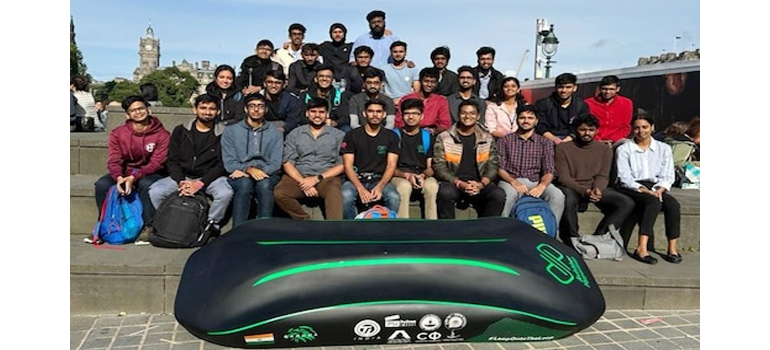
Can you travel from Chennai to Bengaluru in 30 minutes via a rail pod? A team of 50 enthusiastic students from Indian Institute of Technology (IIT)-Madras are working on a hyperloop rail model that can turn this into a reality over the next decade.
The distance between the two cities located in two different states, over 350 kilometres, could be covered in half-an-hour in a pod (a small compartment of passengers) running inside a tube in partial vacuum at a speed of 1,000-1,800 kilometres per hour, students of the ‘Avishkar Hyperloop’ team at the institute said.
The team, which won praise from Union Finance Minister Nirmala Sitharaman a day before on social media platform X (formerly Twitter), says it works day and night to make the hyperloop a reality. They are close to testing the first prototype, the 400-metre-long tube, which is under construction at the moment, next February.
The team, including around eight female students, comprises undergraduate, post-graduate and doctoral students from various interlinked departments working on this futuristic, clean energy transportation solution for inter-city travel at an affordable cost.
The IIT-Madras team stood among the top three globally at the European Hyperloop Week, 2023. It was the only non-European team to be nominated in several award categories in this competition, held at the Scottish National Gallery in Edinburgh, Scotland, this July. The team finished in the global top three for the category of ‘Full Scale Socio-Economic Aspects of Hyperloop,’ showcasing their extensive research on the estimated energy consumption and ticket pricing model of a typical Hyperloop corridor.
“Usually, the average speed of an airplane is around 800-900 kmph while that of a bullet train in Japan is around 400-500 kilometres. But we are building this rail model on hyperloop technology to run on almost double the speed of an airplane. For this, we are doing research on acceleration to know how much force a human body can bear while being inside a vehicle running at an extremely high speed.
“For example, the G force (a measure of acceleration we feel due to force of gravity) will be in the range of 0.7-1.1 Gs. We are going to test our first prototype, the 400-metre-long tube, early next year, transporting cargo on it to study the safety of the system. If we have a successful run, then we will build a 10-km-long tube and scale it up to passengers,” said Prateek Sharma, a third-year bioengineering student, who is heading the team this year.
In order to commercialise the prototype, said Sharma, it may take around 10-20 years to ready the infrastructural and other engineering requirements. “Currently, the world over, hyperloop technology is under research. It will help cut down the carbon footprint to zero and allow a complete green-energy based transportation system, which is the need of the hour given the climate change threats being faced globally,” said Sharma.
Every member in the team of over 50 students has a role assigned to them and each has a contribution to make. While students get free from classes around 6pm, the team members said they come down to the site where the tube is being constructed even during breaks between classes.
“Once the classes are over, those working on the project just come down to the site and work on it well past midnight even though they have to attend classes early next morning. This is the level of enthusiasm we have among project members,” said the team lead.
The team, having been granted several patents on hyperloop technology, is pushing itself forward to build a 350 km-long hyperloop corridor between Chennai and Bengaluru that could bring down the travel time to just 30 minutes.
“We are looking at a timeline of developing India’s first hyperloop corridor in the next two decades — with the first step being on-going construction of the upcoming 400m-long hyperloop test facility at the institute,” said Sidhant Patole, another student team lead.
The major chunk of manufacturing for the project is being done by Indian Railways and other private industry partners.
Professor Satya Chakravarthy, faculty advisor for the project, said: “Over the years, we have got to develop the full stack of hyperloop technologies and I look forward to us improving them in the future.”
Original News Link
https://www.news18.com/education-career/can-iit-madras-hyperloop-model-reduce-travel-from-chennai-to-bengaluru-to-30-mins-we-may-know-soon-8595066.html